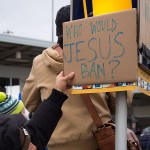 I’ve never understood the appeal of haunted houses or roller coasters or scary movies. I don’t enjoy being afraid and can’t imagine how it can be a form of entertainment. I vividly remember being terrified at haunted houses as a child, and demanding at one that they let me out before the end because it was not fun. It made me cry. I felt awful. People like this kind of thing?
I’ve never understood the appeal of haunted houses or roller coasters or scary movies. I don’t enjoy being afraid and can’t imagine how it can be a form of entertainment. I vividly remember being terrified at haunted houses as a child, and demanding at one that they let me out before the end because it was not fun. It made me cry. I felt awful. People like this kind of thing?
As a grown-up, of course, I can just avoid those things. What I can’t avoid are those things that actually threaten the lives of people around me, systemic inequalities like racism and homophobia expressed through violent white racist policing and church-sanctioned discrimination. And yet, all of the recent fear-mongering on U.S. media around Ebola has meant that I’ve had multiple conversations with students in recent weeks who come into class or stopped by my office and end up expressing their fear of contracting Ebola.
Every time I have the chance, I point out how incredibly difficult it is to get Ebola. How someone living in central Illinois right now has almost no chance of getting this virus. And, how there are much more real things to fear and worry about.
Cheery, right? “Don’t worry about Ebola, kids … worry about paying your tuition bill and buying your books and getting in to graduate school or getting a job! Then, worry about the underrepresentation of women in elective office around the country and the pervasive crippling racism in every town in this nation!” #firstworldproblems
Actually, we should all be worried about the Ebola epidemic in West African countries and how its spread is threatening to weaken their economies and our interconnected global society. We should be worried about our neighbors in Liberia and Sierra Leone and Guinea, and fear that the future is eroding in front them. And we should be worried about stigmatization of people in the U.S. who are connected with this region. Even children who have never been there. We need to worry about how racism and ethnocentrism are shaping our responses.
 I do wonder, though, why so many people in this country are captivated with Ebola-panic and would rather fixate on that than the many problems that stare them in the face every day. They are more like to die of influenza than Ebola, and yet when I went to class the other day after getting my flu shot, encouraging my students to do the same, they scoffed.
I do wonder, though, why so many people in this country are captivated with Ebola-panic and would rather fixate on that than the many problems that stare them in the face every day. They are more like to die of influenza than Ebola, and yet when I went to class the other day after getting my flu shot, encouraging my students to do the same, they scoffed.
A youthful sense of invincibility might account for that response. Yet many young people around me know too well the risks of being black in America, of being gay in the Midwest, and of being a young woman on a college campus.
So why fear Ebola, of all things?
Maybe because it’s easy. It’s a big scary boogieman. It’s tangible. And because it’s unlikely (which most people know at some level), being afraid of it probably functions as a release valve for all the other fears. The fears that we feel powerless to address.
Because it’s easier to run from the zombie in the 5K fun run than it is to run from a fragile economy and catastrophic climate change.
It’s easier to scream at the top of your lungs while bolted in to your seat on the roller coaster than it is to shout back to the man who catcalls you on the street.
It’s easier to cover your eyes while watching a horror movie than it is to look away from the actual pain caused by the murder of Michael Brown. And Oscar Grant. And Eric Garner. And Renisha McBride. And Trayvon Martin.
Because when you walk in to a haunted house, you know you get to walk out again.












